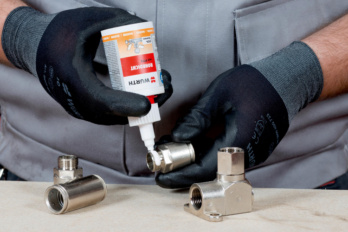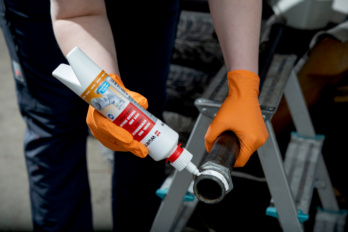The images are examples. For detailed information, other images and documents, please select individual articles from the following table.
Low-strength pipe and thread sealant with PTFE
For sealing all metallic pipe/thread connections and fittings with conical/cylindrical threads in accordance with ISO 7.1 to R3“
Register now and access more than 125,000 products


Variants
Register now and access more than 125,000 products
Call customer service: (23) 418-130
Prices for customers after login
Instant sealing effect, allowing tightened connections to be immediately loaded up to approx. 5 bar and after final hardening, up to the burst pressure of the pipes.
Low strength - easy removal
High media resistance to a large number of bases, gases, solvents, oils and fuels
Sealing compound does not leak out of thread
Quick and secure assembly
In a handy accordion bottle with dispensing system
- Facilitates practical one-handed operation thanks to the clever turn-lock nozzle
- Continuously adjustable dispensing system enables dispensing to be adjusted to suit the application and to keep consumption and costs to a minimum
- Easy to empty residual product
Silicone-free, solvent-free and oil-free
- DVGW approval (reg. no. NG-5146BM0338), tested in accordance with DIN EN 751-1 (not permissible in domestic gas installations in Germany in accordance with DVGW TRGI 2018)
- NSF-tested in accordance with NSF/ANSI 61 for use in service water and drinking water up to +82 °C
- As a result of the intense accelerating effect of copper or copper alloys, the sealant can begin to cure during the sealing process. This can cause micro-cracks, which may lead to leaks in the future. We therefore strongly recommend preliminary tests for process assurance if the pipe sealant with PTFE is used in connections containing copper that will come into contact with water ≥ 40°C in the long-term. The user is responsible for determining the suitability of the product for the particular application and adhesion process.
- The following plastics may be affected in the event of prolonged exposure to the liquid product: ABS, celluloid, expandable polystyrene, polycarbonate (Macrolon), PMMA (Plexiglas), polysulfone, SAN (Luran, Tyril), Vinidur, vulcanised fibre and painted surfaces.
- Not permissible in domestic gas installations in Germany in accordance with DVGW TRGI 2008.


| Resistance to chemicals: (Test based on German standard DIN 54452) | |
| 500 hours in: | Rel. strength in % |
| Water/glycol | 100 |
| Engine oil, MIL-L-46 152 at 125°C | 100 |
| Petrol at 22°C, leaded | 95 |
| Petrol at 22°C, unleaded | 95 |
| Trichloroethane at 22°C | 50 |
| Designation | Gas | Water up to +40°C | Water from +40°C to +65°C | Water over +65°C |
| Copper | ⎷ | ⎷ | see notes | see notes |
| Brass | ⎷ | ⎷ | see notes | see notes |
| Steel plain* | ⎷ | ⎷ | ⎷ | ⎷ |
| *also hot-dip zinc-plated pipes with thread ⎷ = suitable | ||||
Seals metallic pipe connections in compliance with ISO 7.1 (tapered / cylindrical threads) to R3". Also suitable for cylindric-cylindrical threads if these are tightened to ≥ 5 Nm or cured in a vertical position.
This liquid plastic cures when in contact with metal in the absence of oxygen. The contact surfaces must be dry, dust-free and grease-free. Moisten the adhesive surfaces sufficiently and put them together immediately.
For more information, please refer to the technical data sheet.
Select RAL-colour code
!! NOTE: On-screen visualisation of the colour differs from real colour shade!!










